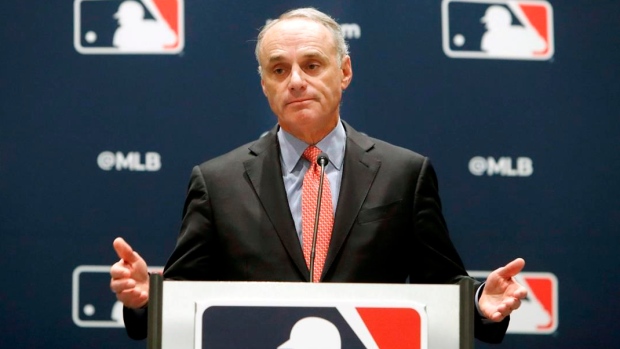Jun 3, 2020
Report: MLB rejects MLBPA's 114-game plan
Major League Baseball has rejected the Players Association’s 114-game season proposal and do not intend to make a counter offer, according to a report by Ken Rosenthal of The Athletic.
The Canadian Press

NEW YORK — If Major League Baseball and its players take the field for a coronanvirus-delayed 2020 season, it will be after acrimonious negotiations that resemble their labour war of a generation ago.
MLB rejected the players' proposal for a 114-game regular season schedule with no additional salary cuts, and will turn its attention to a shortened slate of perhaps 50 games or fewer. Owners last week proposed an 82-game schedule starting in early July
"We do not have any reason to believe that a negotiated solution for an 82-game season is possible,” Deputy Commissioner Dan Halem wrote in a letter Wednesday to chief union negotiator Bruce Meyer that was obtained by The Associated Press.
MLB's plan included a sliding scale of pay decreases that would leave players at the $563,500 minimum with 47% of their original salaries and top stars Mike Trout and Gerrit Cole at less than 22% of the $36 million they had been set to earn.
Players insisted they receive the prorated salaries agreed to in a March 26 deal, which would give them 70% pay at 114 games. That agreement called for the sides to “discuss in good faith the economic feasibility of playing games in the absence of spectators.” The union has said no additional cuts are acceptable.
Ballparks without fans appear certain due to the pandemic. MLB claims large losses due to the virus, which the union disputes, and teams want additional salary reductions. Halem said 27 of the 30 teams would lose money with each additional game.
A 50-game schedule would result in players receiving about 30% of their full salaries under the March 26 deal.
“You confirmed for us on Sunday that players are unified in their view that they will not accept less than 100% of their prorated salaries, and we have no choice but to accept that representation,” Halem wrote.
“Nonetheless, the commissioner is committed to playing baseball in 2020,” Halem added. “He has started discussions with ownership about staging a shorter season without fans.”
Halem ended his letter by telling Meyer “we stand ready to discuss any ideas you may have that might lead to an agreement on resuming play without regular fan access in our stadiums.”
MLB wants to start the season in early July, and Halem wrote an agreement would have had to be reached by June 1 in order to reopen training camps by June 10. That would leave three to four weeks of preparation, which Halem said is the “wide consensus.”
“We are opposed to rushing to begin the season and then subjecting players to a grueling schedule,” he said.
Players made their proposal Sunday, five days after management's initial economic plan. Opening day would be June 30 and the regular season would end Oct. 31, nearly five weeks after the Sept. 27 conclusion that MLB’s proposal stuck to from the season’s original schedule.
MLB does not want to play past October because it fears a second wave of the coronavirus could disrupt the post-season and jeopardize $787 million in broadcast revenue. Halem cited MLB's infectious disease consultant, Dr. Ali Khan, Dean of the College of Public Health at the University of Nebraska.
“It is not in the collective interest of clubs or players to begin a 2020 season and subsequently be forced to suspend or cancel it before the completion of the post-season,” Halem wrote.
“Dr. Khan and his team have advised us that to minimize the risk of a subsequent delay or cancellation of the 2020 season we should endeavour to complete the season and post-season as early in the fall as possible," he wrote. "In addition, your proposal ignores the realities of the weather in many parts of the country during the second half of October. If we schedule a full slate of games in late October, we will be plagued by cancellations.”
As part of the March 26 deal, players got $170 million in salary advances —- ranging from $16,500 to $286,500 — and a guarantee that if the season is scrapped each player would get 2020 service time matching what the player accrued in 2019.
MLB’s proposal on May 26 would lower 2020 salaries from about $4 billion to approximately $1.2 billion, not including signing bonuses, termination pay or option buyouts. There would be a $200 million bonus if the post-season is completed.
The union’s offer would have salaries total about $2.8 billion, leaving each player with about 70% of his original salary.
Halem said coronavirus testing would cost the teams $40 million to $50 million. He claimed “clubs would fare even worse economically if we were to play a significant number of doubleheaders, as your counter-proposal contemplates.”
Players proposed that $100 million in salaries be deferred to 2021 and 2022 if the post-season is cancelled.
“Deferring salaries, with interest, is the economic equivalent of assuming more debt,” Halem said. “Clubs already have assumed $2 billion in additional debt that must be serviced and do not have the financial capacity to push more 2020 financial obligations into future years without impacting their financial stability.”
Both sides have proposed expanding the playoffs from 10 teams to 14, and the union has offered to guarantee the expansion through 2021. Both sides also are willing to widen use of the designated hitter to all games this year.
The union proposed high-risk players, or players who live with a high-risk individual, be able to opt out of playing, and MLB has said it is willing to discuss the topic. MLB, however, says other players who opt out would get neither salary nor service time, which is key to eligibility for free agency and arbitration. The union proposed that group not get paid but receive service time.

